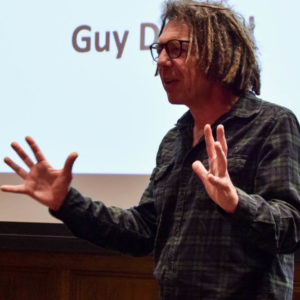
David Goldblatt, a sports sociologist and author, gave a lecture titled “Football is First: The Global Game in the 21st Century” April 1 in Choi Auditorium. Goldblatt is the author of “The Ball is Round: A Global History of Soccer” and a guest professor at Pitzer College. The lecture focused on the ability of soccer — or football, as Goldblatt calls it — to serve as a sociological lens and used the 2014 FIFA World Cup Final between Germany and Argentina as a case study for economic and political analysis.
“Football is unquestionably the most popular sport in the world. Not just in terms of numbers of people who play it or who follow it, but at the scale and level of the emotional and intellectual engagement that it produces,” Goldblatt said. “No other sport can really match it at that level.”
Goldblatt’s lecture was framed as a conversation with Carlos Monsiváis, a Mexican political activist and writer, and Guy Debord, a French Marxist theorist. Goldblatt asked the audience to imagine taking these two men to the 2014 FIFA World Cup Final in Rio de Janeiro, Brazil.
“Right in the heart of the spectacle there is an indissoluble humanity,” Goldblatt said. “Play is a realm of invention, of fun, of communality, of experiment and all of those things are ultimately undermined by too much economic and political power.”
Professor Derek Shearer, director of the McKinnon Center for Global Affairs and former U.S. ambassador to Finland, organized the event. Shearer said he is teaching a class, which he has previously taught, called Sports and Diplomacy in a Globalized World in Fall 2019. According to Shearer, he tries to bring in speakers like Goldblatt in conjunction with the class.
“In the fall, in addition to my class, there will be more guest speakers,” Shearer said. “I’m a professor of practice, not theory — real world — and so the more you can bring real-world diplomats, authors and of course scholars from other universities, the better it is for students.”
Professor Jennifer Piscopo, who is teaching a class entitled Politics, Culture and Sports this semester, attended Goldblatt’s lecture.
“I thought that his passion is really obvious and makes for a really entertaining lecture,” Piscopo said. “In my view, he’s right about the way the game has been globalized and commercialized and the way that’s created these sorts of inequalities.”
In his lecture, Goldblatt talked about how soccer has both impacted and been impacted by migration, labor, big data and technology. He said the World Cup, in particular, showcases the political corruption and corporate domination of soccer, but — if examined closely — signs of a counter-spectacle of protests and demonstrations can be seen.
“Football is bound to a gigantic economic industry,” Goldblatt said. “We ask ourselves, ‘Is Adidas winning or is Nike winning?’”
The result of this intense economic and political involvement in soccer, according to Goldblatt, is extreme excellence at the top levels of soccer. He said, however, that this creates an unequal distribution of those successes to the rest of the world.

Piscopo said she thinks there are benefits to bringing specialized experts like Goldblatt to campus for lectures.
“I think when we bring someone that has this unique expertise that overlaps and compliments what our faculty are doing in the classroom, but is really digging deeply into a particular area, I think it really benefits the students, and I think it also creates that kind of intellectual interchange that we want to have between students and faculty members,” Piscopo said. “Sports really gives us a lens to ask questions that transcend sports.”
According to Piscopo, her Politics, Culture and Sports class uses sports as a sociological lens to examine race, gender and other topics.
Shearer said people in ancient societies like the Greeks and Aztecs played sports, which reveals how universal they are to the human experience.
“Sports is part of being human and you can see history and politics through the development of sports,” Shearer said. “A couple of [Diplomacy and World Affairs] students every year do their senior thesis on sports.”
Following the lecture, Goldblatt answered questions from the audience and then joined faculty and students for a reception in the McKinnon Center for Global Affairs.
Goldblatt will present his lecture at the University of California, Berkeley April 18. According to Goldblatt, his book, “The Age of Football: The Global Game in the 21st Century” is coming out in August and will be a sequel to “The Ball is Round.”
“Politics, again, always present in football, never absent, but at a scale now that is unimaginable,” Goldblatt said. “I honestly believe — that read in the right way — football, it has a way of upsetting the order of the world. It offers a glimpse and a possibility of alternative interpretations that are deeply problematic for the ruling order.”
![]()






























